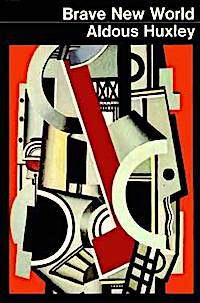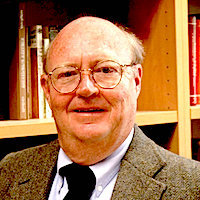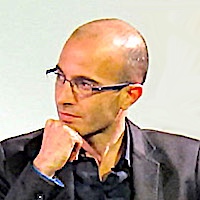

Tao Te Ching

Brave New World
Called by historians “the most prophetic book of the 20th century,” Huxley took this title from Shakespeare’s, The Tempest—a play set in the naive optimism of the recent discovery of the New World and a belief that the new technology responsible for this discovery would bring an unprecedented golden age. The story begins in 632 AF (After Ford, "His Fordship"), 600 years after the V-8 went into production revolutionizing the automobile market. Revered as a prophet because of inventing the assembly line and facilitating consumerism, Henry Ford’s image and symbolism become god-like. Considered similar and parallel to Orwell’s famous book, 1984, Huxley’s vision is more psychological and internal. Orwell feared external oppression, Huxley internal manipulation. Orwell foretold banning and burning books, Huxley a hypnotic dumbing down that made reading unpopular and considered irrelevant. Orwell worried about censored information, Huxley about people drowning in an ocean of irrelevancies. Orwell’s concern was external power and control, Huxley’s misgivings focused on the corrosive effects of trivializing entertainments. Orwell dreaded control by force and pain, Huxley control by pleasure and brain-washing. As Neil Postman wrote, “Orwell feared that what we hate will ruin is. Huxley feared that what we love will ruin us.” History has shown that Huxley’s foreseeing was much more accurate.
Themes
Quotes from Brave New World
“'All right then,' said the savage defiantly, 'I'm claiming the right to be unhappy… the right to grow old and ugly and impotent; the right to have syphilis and cancer; the right to have too little to eat… the right to be tortured by unspeakable pains of every kind. I claim them all.'”
Chapters:
Comments: Click to comment
“'Did you eat something that didn't agree with you?' asked Bernard. The Savage nodded. 'I ate civilization.'”
Chapters:
Comments: Click to comment
“...most men and women will grow up to love their servitude and will never dream of revolution.”
Chapters:
Comments: Click to comment
“...reality, however utopian, is something from which people feel the need of taking pretty frequent holidays.”
Chapters:
Comments: Click to comment
“A really efficient totalitarian state would be one in which the all-powerful executive of political bosses and their army of managers control a population of slaves who do not have to be coerced, because they love their servitude.”
Chapters:
Comments: Click to comment
“Actual happiness always looks pretty squalid in comparison with the overcompensations for misery. And, of course, stability isn't nearly so spectacular as instability. And being contented has none of the glamour of a good fight against misfortune, none of the picturesqueness of a struggle with temptation, or a fatal overthrow by passion or doubt. Happiness is never grand.”
Chapters:
68. Joining Heaven & Earth
Comments: Click to comment
“Back to culture. Yes, actually to culture. You can’t consume much if you sit still and read books.”
Chapters:
Comments: Click to comment
“But I don't want comfort. I want God, I want poetry, I want real danger, I want freedom, I want goodness. I want sin. — John the Savage”
Chapters:
24. Unnecessary Baggage
Comments: Click to comment
“God isn't compatible with machinery and scientific medicine and universal happiness. You must make a choice. Our civilization has chosen machinery and medicine and happiness.”
Chapters:
Comments: Click to comment
“I'd rather be unhappy than have the sort of false, lying happiness you were having here.”
Chapters:
Comments: Click to comment
“If one's different, one's bound to be lonely.”
Chapters:
Comments: Click to comment
“It is perfectly possible for a man to be out of prison and yet not free—to be under no physical constraint and yet to be a psychological captive, compelled to think, feel and act as the representatives of the national State, or of some private interest within the nation, want him to think, feel and act.”
Chapters:
Comments: Click to comment
“Most human beings have an almost infinite capacity for taking things for granted.”
Chapters:
Comments: Click to comment
“We don't want to change. Every change is a menace to stability.”
Chapters:
Comments: Click to comment
“Words can be like X-rays if you use them properly—they’ll go through anything. You read and you’re pierced.”
Chapters:
Comments: Click to comment
“Words can be like X-rays if you use them properly—they’ll go through anything. You read and you’re pierced.”
Chapters:
Comments: Click to comment
”
Chapters:
Comments: Click to comment
Chapters:
Comments: Click to comment
Related Lineages (0 lineages)
Quotes about Brave New World (3 quotes)

“Huxley’s 1932 novel is about a world without love. Far from being outdated, it has a profound message for our day showing us a society that confounds sex with love, family disintegrating under the impact of scientific reproduction techniques that turn out children perfectly adapted to their roles in society. Pornography, meaningless travel, and mindless consumerism fill the time of people who have no concept of religion, honor, or great literature.”
Comments: Click to comment

“the most prophetic science-fiction book of the 20th century... reading Brave New Word is a disconcerting and challenging experience in large part because you are hard-pressed to put your finger on what exactly makes it dystopian... Huxley's genius consists in showing that you can control people far more securely through love and pleasure than through fear and violence.”
Comments: Click to comment

“Huxley's vision of the future is far more troubling than George Orwell's 1984. Huxley's world seems monstrous to most readers, but it is hard to explain why. Everybody is happy all the time — what could be wrong with that.”
Comments: Click to comment
Comments (0)